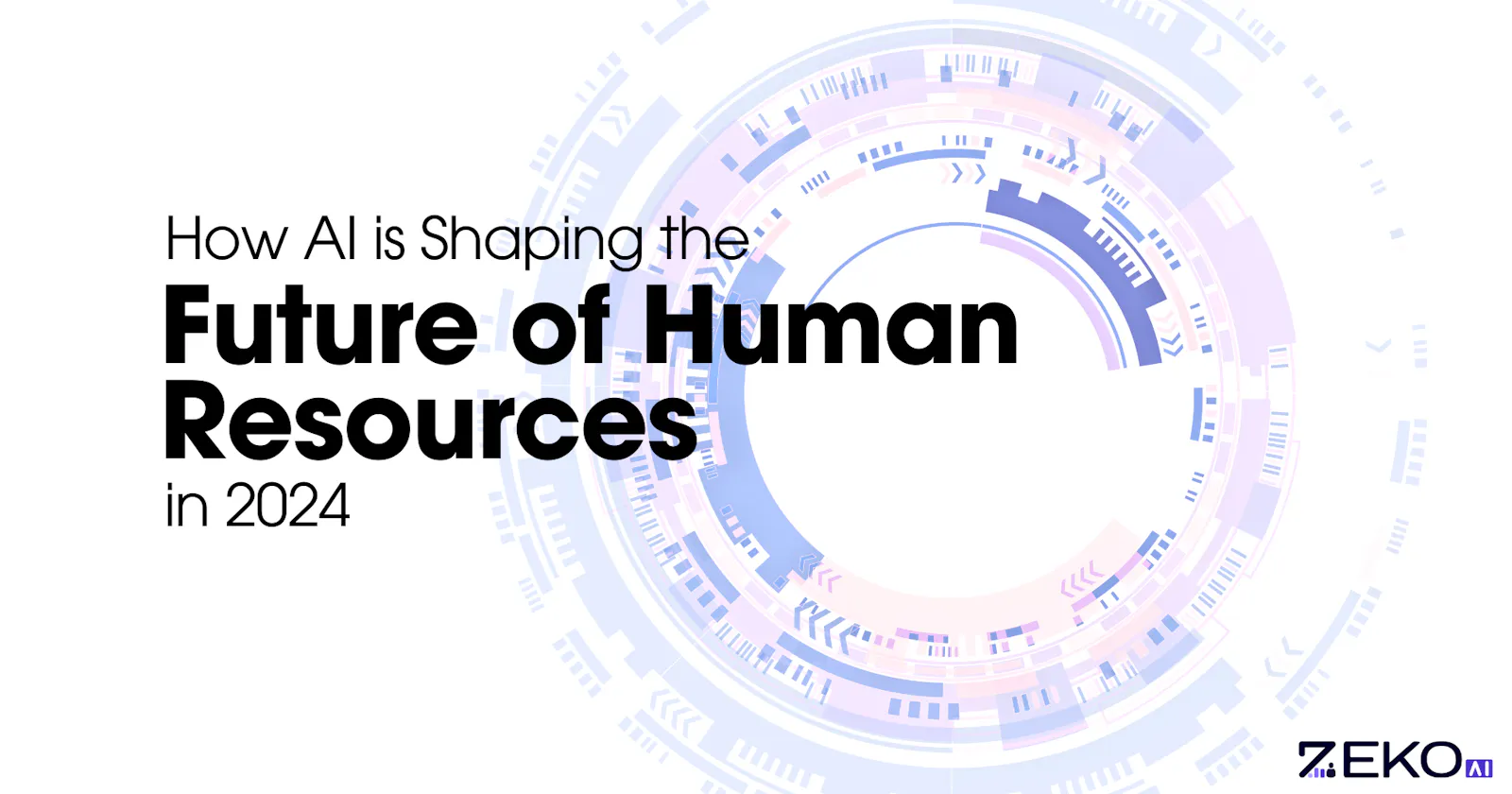Introduction
Human resources (HR) is becoming more than just a department concerned with managing personnel and procedures in the dynamic business environment; it is now a vital strategic partner that promotes organizational success. HR departments are under pressure to streamline operations, enhance employee experiences, and match with business objectives as a result of growing commercial competitiveness, globalization, and a quickly evolving workforce. Artificial Intelligence (AI) is leading the way in the adoption of new technologies as a result of this change.
AI is revolutionizing HR and changing how businesses find, nurture, and grow talent. Artificial Intelligence (AI) is revolutionizing human resource management by increasing efficiency in HR and changing the fundamentals of the field, from automating tedious administrative duties to offering data-driven insights. While AI's impact on HR is well-documented, this essay will provide a fresh perspective by focusing on the latest advancements and emerging trends in 2024, offering a comprehensive analysis of its potential, advantages, and challenges. This article will also examine how artificial intelligence (AI) will affect human resources (HR) in 2024, offering a thorough analysis of its potential, advantages, drawbacks, and emerging trends.
AI in HR: A Game Changer
In the HR domain, artificial intelligence pertains to the utilization of machine learning algorithms, data analytics, and automation tools for the purpose of optimizing and streamlining diverse HR procedures. With AI's capacity to analyze massive amounts of data, spot trends, and reach well-informed conclusions, HR professionals may concentrate on more strategic duties. Here are some important areas in HR where AI is having a big influence:
Recruitment: Through the automation of crucial processes like candidate matching, resume screening, and preliminary interviews, artificial intelligence (AI) is revolutionizing the hiring process. Zeko's toolkit, which includes Zeko Hunt, Zeko Screen, and Zeko Interview, is one example of this change. Zeko Interview uses AI to analyze video interviews for insights into candidates' facial expressions, voice intonation, and word choice. Zeko Hunt automates the sourcing of candidates. Zeko Screen expedites the examination of resumes. By offering more in-depth, data-driven insights into candidate potential, these tools improve recruiting efficiency and accuracy, much like Unilever employs AI-driven algorithms to predict job performance.
Training and Development: By offering individualized learning experiences, AI is completely changing the way that employees receive training. AI is used by platforms like as EdCast to suggest courses to employees based on their learning preferences, career goals, and skill gaps. By ensuring that workers receive the appropriate training at the appropriate time, job satisfaction and performance are raised.
Performance Management: Standard performance evaluations are frequently biased and subjective. Artificial Intelligence provides accurate information on efficiency, enthusiasm, and opportunities for improvement by analyzing employee performance data in real-time. Businesses such as IBM leverage artificial intelligence (AI) to identify high-risk individuals and recommend tailored retention tactics.
Benefits of AI for HR
AI integration in HR has several advantages; it will change the way HR professionals work and improve the working environment for all employees. Some of the main benefits are as follows:
1. Enhanced Productivity and Decreased Administrative Stress: By automating repetitive activities like interview scheduling, resume screening, and onboarding process management, artificial intelligence (AI) dramatically increases HR efficiency. These jobs, which were formerly laborious and prone to human error, can now be completed quickly and precisely by AI-powered systems.
For example, Leena, an AI-powered chatbot, expedites the hiring process by responding to inquiries, setting up interviews, and sending out updates. HR specialists can concentrate on more strategic tasks, like organizational planning and talent development, as a result of the time savings. Additionally, less administrative work means that resources are maximized and human capital is used more effectively in the HR department.
2. Data-Driven Decision Making: Facilitating data-driven decision-making is one of AI's most revolutionary applications in HR. AI gives HR managers useful insights through data analysis that allows them to predict employee attrition, spot high-potential talent, and assess the success of training initiatives. With the use of tools like AI-driven analytics systems, HR professionals may gain a deeper understanding of workforce dynamics and make decisions that are more in line with the objectives of the company. Better results for the business and its employees are achieved when HR decisions are made with a data-centric approach, which also increases the accuracy of these decisions and guarantees that they are supported by facts.
3. Enhanced Worker Experience: By providing individualized support and engagement, artificial intelligence (AI) significantly improves the overall work experience for employees. AI-driven solutions may offer real-time feedback, help employees plan their careers, and customize professional development plans to meet their specific goals. For instance, IBM's Watson Career Coach uses AI to provide employees with personalized learning materials and career guidance, enabling them to more successfully navigate their professional pathways. Because they feel encouraged in their personal development, workers are more engaged when there is this degree of personalization. Furthermore, AI's capacity to deliver prompt, precise answers to employee inquiries adds to a productive workplace where staff members feel appreciated and empowered.
3. Reduced prejudice in Hiring and Promotion: One of HR's biggest problems, unconscious bias in hiring and promotion procedures, may be solved by AI. Organizations can make sure that candidate evaluations are based only on objective standards like skills and qualifications by utilizing AI-driven solutions. These algorithms examine candidate data devoid of human prejudice, which frequently influences choices based on personal characteristics such as looks or background. Consequently, AI encourages merit-based recruiting and promotion, which contributes to the development of a more diverse and inclusive workforce. This change promotes diversity and inclusion, which not only makes HR procedures more equitable but also strengthens the culture of the entire company.
4. Cost Savings through Automation: Because AI can automate tedious HR processes, businesses can save a significant amount of money. For example, by effectively handling high application volumes and eliminating the need for intensive human processing, the use of AI-powered Applicant Tracking Systems (ATS) can optimize the hiring process. The time and resources needed for hiring are reduced by this automation, which results in large cost savings. Furthermore, by reducing errors and increasing efficiency, AI-driven HR activities like payroll processing and benefits management also lower operating expenses. In the long run, these savings will result in a more economical HR division that can devote funds to more important projects, which will ultimately help the company as a whole.
Hottest AI Trends in HR for 2024
As AI continues to evolve, several emerging trends are set to shape the future of HR in 2024. These trends go beyond basic AI applications, offering innovative solutions that will further enhance HR processes:
Generative Artificial Intelligence
Generative AI will completely change the way we manage talent and workplace dynamics. Examples of such products are ChatGPT and the ever-expanding list of tools that are based on the technology. Day-to-day, HR specialists will have the ability to expedite numerous procedures, including hiring, training, workforce planning, and administrative work. They will also need to reconcile the efficiency of AI with the human attributes that are still crucial in business, while navigating the human ramifications of this drastic shift.
AI-Powered Talent Analytics
Another revolutionary development that empowers HR professionals to make data-driven choices is AI-powered talent analytics. Artificial Intelligence (AI) can predict skill gaps, identify top performers, and predict employee attrition by analyzing massive volumes of personnel data. This enables HR departments to use focused retention initiatives in order to proactively address possible problems, like high turnover rates. Additionally, workforce planning can be aided by AI-driven data, guaranteeing that the necessary personnel is available to fulfill future organizational demands. Organizational performance is improved and people management strategies are being strengthened by companies depending more and more on these insights
Conversational AI (Visual Assistants & Chatbots)
The emergence of conversational AI in HR is changing self-service capabilities and employee engagement. These days, chatbots and virtual assistants are frequently employed to respond to employee questions, offer round-the-clock assistance, and help with standard HR duties like leave and benefit inquiries. By providing prompt, correct responses, lessening the workload for HR teams, and freeing up time for other strategic endeavors, these AI solutions enhance the employee experience. Conversational AI integration also improves accessibility, guaranteeing that workers may access HR services from any location at any time.
AI in HR Compliance & Policies
AI is essential to automating the development of HR policies and guaranteeing legal compliance. Artificial Intelligence has the capability to create rules that comply with existing regulations and minimize hazards by scrutinizing legal mandates and corporate guidelines. AI is also capable of continuously monitoring compliance, identifying deviations and recommending remedial measures. This lessens the possibility of legal problems and aids in maintaining an ethical and compliant environment for firms. The application of AI in HR compliance is becoming more and more crucial for reducing risks and guaranteeing standard conformity as regulatory environments grow more complicated.
Challenges & Considerations
While AI offers numerous benefits, its implementation in HR is not without challenges. It is important to address these concerns to ensure responsible and ethical use of AI:
Ethical Implications of Bias: AI systems can only be as good as the data they are trained on. The AI is likely to generate biased results if the data is biased. Biased AI has the potential to produce unfair decisions in performance management and recruitment, which is a serious concern. HR teams need to make sure AI models are trained on a variety of representative data sets and are regularly checked for bias in order to reduce this risk.
Fears about Job Displacement: AI-powered HR task automation raises questions about job displacement. Although AI is capable of handling monotonous duties, it cannot take the place of HR experts' strategic and compassionate roles. Organizations should concentrate on upskilling HR teams so they can use AI tools and take on greater responsibility in order to allay these fears.
Human Oversight and Decision-Making: In HR procedures, AI should supplement human judgment rather than replace it. It is imperative for HR personnel to exercise control over AI-driven choices to ensure their alignment with the organization's ethical and values framework. The use of AI in HR procedures must be transparent to stakeholders and employees, who must be aware of its application.
Empowering HR Leaders: Resources & Strategies
For HR professionals looking to embrace AI, the following resources and strategies can help build an AI-ready HR team and develop a successful AI implementation plan:
Online Certifications and Courses: HR professionals can further their understanding of AI by obtaining certifications and taking online courses. AI for HR courses are available on platforms like Coursera and edX, covering subjects including AI ethics, predictive analytics, and AI-driven talent management. For HR professionals who want to learn more about AI's applications in HR, IBM's AI HR certification is an invaluable tool.
Creating an AI-Ready HR Team: HR teams need to have the necessary expertise and knowledge in order to successfully apply AI. Training and development initiatives centered on artificial intelligence, data analysis, and technology management should be funded by organizations. Fostering a culture of innovation and propelling the adoption of AI can also be achieved by promoting cross-functional collaboration across HR, IT, and data science teams.
Creating an AI Implementation strategy: The first step in creating a successful AI implementation strategy is to clearly identify the objectives and demands of the HR department of the company. HR directors ought to pinpoint particular domains, like hiring, employee engagement, or compliance, where AI might be beneficial. A roadmap for the implementation of AI should also be included of the plan, complete with deadlines, resources, and performance indicators to monitor advancement.
Zeko AI Enabled HR Tech
Zeko.ai stands at the forefront of this AI-driven transformation in HR. Zeko.ai provides HR departments with cutting edge AI solutions that are particularly designed to meet their needs. This allows HR departments to make data-driven decisions that increase productivity and create a more engaging work environment. Our products are made to ensure that businesses stay competitive in the ever-changing business landscape while also keeping up with the newest technological developments. We do this by streamlining procedures, eliminating prejudices, and enhancing the entire employee experience. HR directors may successfully incorporate AI into their strategy by adopting Zeko.ai's novel methodology, paving the way for more dynamic and egalitarian workplaces in the future.
Conclusion:
There is no denying that the developments in AI will have an impact on HR in the future. Artificial Intelligence (AI) provides enterprises with effective tools to make data-driven choices, improve productivity, and personalize employee experiences as they traverse the complexity of the modern workplace. However, a careful strategy that strikes a balance between technological innovation, ethical issues, and human oversight is needed for the successful integration of AI in HR. HR directors will be well-positioned to guide their companies into the future if they embrace AI and make the investment to create teams who are prepared for it. Organizations may gain a competitive edge and cultivate a more diverse, creative, and dynamic work environment by utilizing AI to streamline HR procedures, lessen prejudice, and increase employee engagement.



